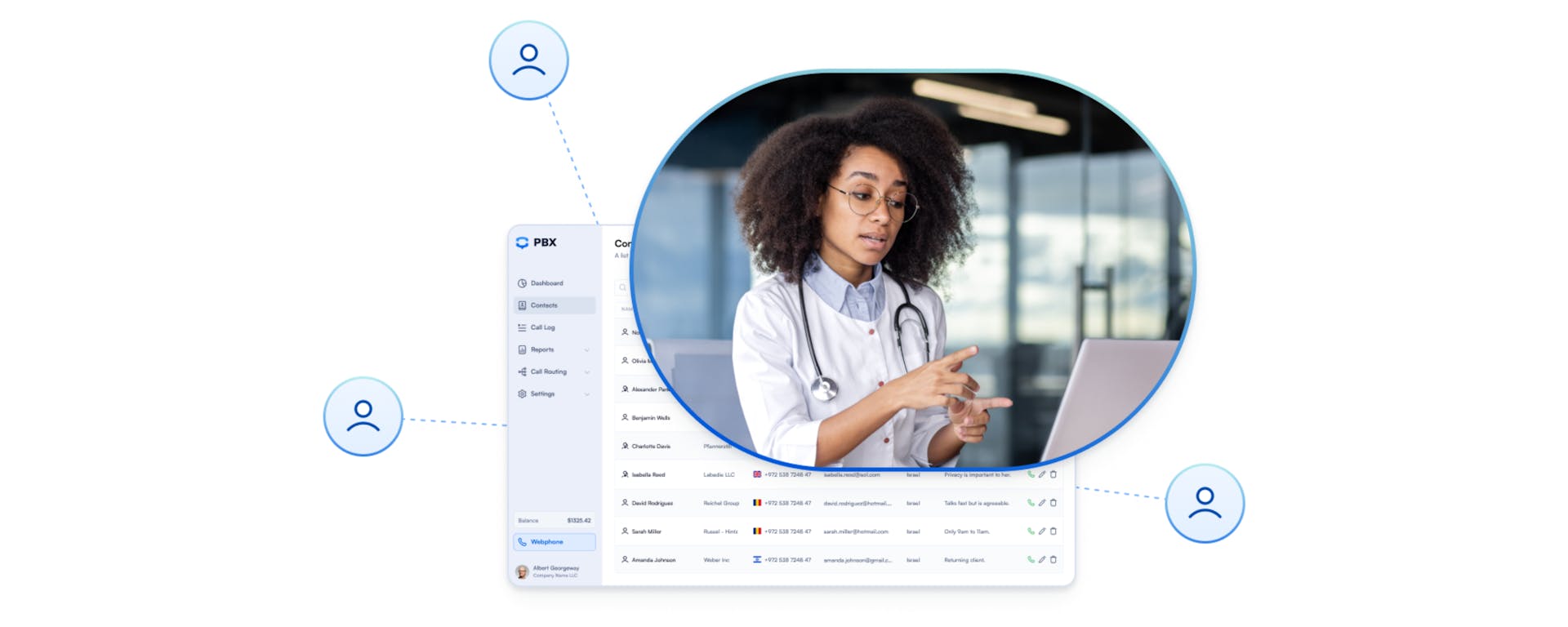Managing patient inquiries and scheduling appointments is a daily challenge for healthcare facilities, often leading to long wait times and frustrated patients. But what if there were a simple way to streamline communication and improve patient satisfaction? A unified communications platform for healthcare with Direct Inward Dialing (DID) numbers offers a cost-effective solution, allowing healthcare providers to manage high call volumes efficiently. Companies like PBX.IM provide Healthcare VoIP Cloud Phone Systems specifically designed for healthcare providers, demonstrating how these platforms can be tailored to industry needs. In this article, we explore how DID numbers can transform the way clinics and hospitals handle patient calls, reduce administrative burdens, and enhance the overall patient experience.
Key takeaways:
- Improve patient satisfaction: get a unified communications platform that supports DID numbersto streamline patient calls, reducing wait times and ensuring a smoother communication experience.
- Enhance efficiency: Allocate specific numbers to different departments, making patient inquiries more manageable without needing extra staff or physical phone lines.
- Cost-effective scalability: Easily expand your DID system as your practice grows, keeping operations seamless without the need for large infrastructure changes.
What are DID numbers? Definition
Direct Inward Dialing (DID) numbers are virtual phone numbers that allow patients to reach the right department or person within a healthcare facility without going through a central receptionist. By assigning direct numbers for specific services like billing or appointments, patients can quickly get the help they need without long wait times.
How DID numbers work in a healthcare setting
In a unified communications platform in healthcare, DID numbers help manage the constant influx of patient calls. Whether it's someone trying to book an appointment, inquire about test results, or ask for clarification on a prescription, a DID system ensures that each call is routed to the correct team or staff member.
For instance, a clinic might assign separate DID numbers for scheduling appointments, billing inquiries, and nurse consultations. This ensures patients connect directly with the right team, reducing call transfers and improving response times.
The benefits of unified communications platform in healthcare
DID numbers offer numerous benefits, particularly if you manage a high volume of patient inquiries daily. From speeding up response times to improving patient satisfaction, they can be a powerful tool for any clinic or hospital.
- Streamlining patient inquiries and improving satisfaction
DID numbers allow healthcare facilities to allocate specific phone lines to different departments, speeding up response times and reducing wait times. When patients are quickly connected to the right team, they enjoy a more personalized experience, resulting in higher satisfaction and loyalty.
DID numbers can transform patient communication in multiple ways:
- Faster Response Times: Patients are connected to the right department immediately, reducing hold times by up to 30%.
- Lower Administrative Costs: Fewer staff are needed to manage incoming calls, as DID numbers automate the process.
- Improved Patient Experience: Direct access to departments minimizes frustration and ensures patient needs are met more efficiently.
- Simplified appointment scheduling
Scheduling appointments is one of the most frequent tasks a healthcare business has to handle.
With DID numbers, patients can directly reach the scheduling department, bypassing the general phone line. This streamlines the process and ensures that calls are handled faster, without the need for front-desk staff to manually transfer calls. By directing calls to the right department, DID numbers can significantly reduce the workload of receptionists, allowing them to focus on other tasks that require personal interaction.
Cost-effectiveness of DID numbers within healthcare communications platform
Reducing communication overheads
Healthcare businesses often deal with high communication costs due to the need for multiple phone lines and the staff required to manage them. DID numbers offer a cost-effective alternative by eliminating the need for several physical lines. Since calls can be directed through a virtual system, practices can reduce expenses related to maintaining multiple lines and allocating extra resources to manage calls.
Avoiding the need for a large customer service team
By streamlining call management with DID numbers, healthcare providers can handle a higher call volume without needing to hire more front-office staff. Instead of paying for additional team members to manually direct and manage calls, the DID system does it automatically, allowing the existing staff to focus on more value-added tasks.
Scalability for growing healthcare practices
One of the greatest advantages of DID numbers is their scalability. As your healthcare practice grows, the need for managing more patient inquiries increases. DID numbers can easily scale with your practice. You can add more numbers as your patient base grows, without having to worry about the logistics of installing new phone lines or expanding your front-office team.
Whether you’re expanding into a new location or adding specialised services, the flexibility of DID numbers allows you to keep communication efficient and seamless.

Practical considerations for implementing DID numbers
Choosing the right provider
Implementing DID numbers requires choosing the right provider, and not all providers are created equal. Reliability should be your top priority. You’ll want a service provider that offers consistent uptime, as patient calls are often time-sensitive. Technical support is also crucial; your provider should offer 24/7 support to resolve any issues that may arise. At PBX.IM we offer 24/7 hours support and 99,99% uptime.
Also, consider the provider’s pricing structure. Some charge per number, while others may offer more flexible packages based on usage. Evaluate your clinic’s specific needs, such as the volume of calls and the number of departments, to find the right fit.
Integrating with existing systems
Another key consideration is how DID numbers will integrate with your existing systems. Your current telephony and patient management systems should work seamlessly with the new system to avoid any disruption. Most modern healthcare practices rely on electronic health record (EHR) systems that also handle scheduling, billing, and patient communication. Ensuring that your DID numbers can integrate with these systems will allow you to continue offering a streamlined service without additional complications.
Ensuring security and compliance
In healthcare, protecting patient data is non-negotiable. When implementing DID numbers, ensure that the system complies with relevant regulations such as GDPR in Europe or HIPAA in the US. This involves encrypting communications and implementing robust security measures to protect sensitive patient information from breaches.
Conclusion
Unified communications platform with DID numbers are an easy-to-implement solution that can dramatically improve patient communication, reduce overhead costs, and scale effortlessly as your practice grows. By choosing the right provider and ensuring integration with your existing systems, healthcare businesses can provide a more efficient, patient-centered experience.

Upgrade to healthcare unified communication platform with DID numbers today and start reaping the benefits of streamlined communication.
FAQs
What are DID numbers in healthcare?
DID (Direct Inward Dialling) numbers are unique phone numbers that route patient calls directly to specific departments or staff, improving communication efficiency in healthcare settings.
How do DID numbers improve patient satisfaction?
DID numbers reduce wait times and allow patients to connect directly to the relevant department or staff. This streamlines the communication process, providing quicker, more personalized service.
Can a healthcare communications platform with DID numbers save time for healthcare staff?
Yes, DID numbers significantly reduce the need for manual call routing by automatically directing calls to the correct departments. This can save up to 30% of handling time, boosting productivity.
Are DID numbers scalable for growing healthcare practices?
DID numbers are highly scalable, allowing healthcare providers to add more numbers as their patient base grows, without needing new phone lines. This flexibility supports business growth. Unified communications in healthcare can manage all.
How do I choose a healthcare communications platform with a DID number?
When choosing a provider, prioritize reliability, secure VoIP, integration with existing systems, and compliance with healthcare regulations such as GDPR or HIPAA. Look for 24/7 technical support and flexible pricing plans.

I’m a VoIP product strategist with hands-on experience building and scaling communication tools. At PBX.IM , she simplifies complex topics like SIP and cloud telephony to help businesses make smart, confident tech decisions.


